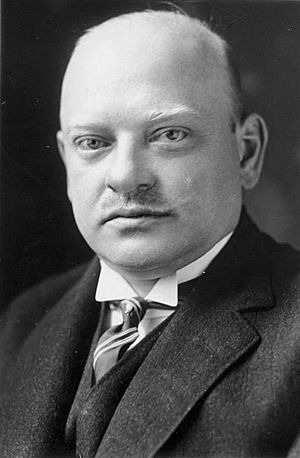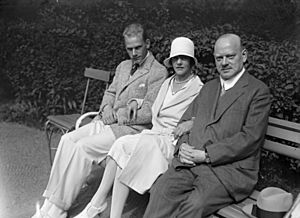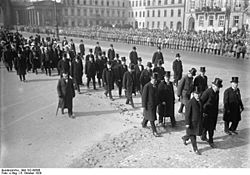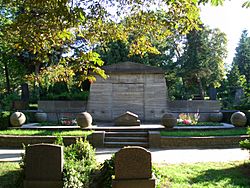Gustav Stresemann facts for kids
Quick facts for kids
Gustav Stresemann
|
|
|---|---|
 |
|
| Chancellor of Germany | |
| In office 13 August 13 1923 – 23 November 1923 |
|
| Preceded by | Wilhelm Cuno |
| Succeeded by | Wilhelm Marx |
| Foreign Minister and Chancellor | |
| In office 13 August 1923 – 23 November 1923 |
|
| Foreign Minister | |
| In office 23 November 1923 – 3 October 1929 |
|
| Personal details | |
| Born | 10 May 1878 |
| Died | October 3, 1929 (aged 51) |
| Political party | National Liberal Party (1907-1918) German Democratic Party (1918) German People's Party (1918-1929) |
Gustav Stresemann (10 May 1878–3 October 1929) was a German liberal politician who was Chancellor and Foreign Minister of Germany during the Weimar Republic. He shared the Nobel Peace Prize in 1926.
Stresemann's politics are hard to define. Today, he is generally considered one of the most important leaders of Germany and a staunch supporter of democracy in the fragile Weimar Republic. He is noted as one of the first to see European economic integration. Arguably, his most notable achievement was reconciliation between Germany and France, for which he and Aristide Briand received the Peace Prize.
Contents
Early years
Stresemann was born on 10 May 1878 in the Köpenicker Straße area of southeast Berlin, the youngest of seven children. His father worked as a beer bottler and distributor, and also ran a small bar out of the family home, as well as renting rooms for extra money. The family was lower middle class, but relatively well-off for the neighbourhood, and had enough money to give Gustav with a high-quality education.
Stresemann was an excellent student, especially in German literature and poetry. In an essay written when he left school, he wrote that he would have enjoyed becoming a teacher, but he would only have been qualified to teach languages or the natural sciences, which were not his primary areas of interest. He entered the University of Berlin in 1897 to study political economy. During his studies, Stresemann was exposed to the principal political arguments of his day, particularly the German debate about socialism.
During his university years, Stresemann also became active in Burschenschaften movement of student fraternities, and in April 1898 became editor of the Allgemeine Deutsche Universitäts-Zeitung (English: General German Universities Newspaper), a newspaper run by Konrad Kuster, a leader in the liberal part of the Burschenschaften. His editorials for the paper were often political, and dismissed most political parties as wrong in one way or another. In these early writings, he combined liberalism with nationalism. In 1898, Stresemann left the University of Berlin, and went to the University of Leipzig so that he could study for a doctorate. He completed his studies in January 1901, submitting a thesis on the bottled beer industry in Berlin, which received a relatively high grade.
In 1902 he founded the Saxon Manufacturers' Association. In 1903 he married Käte Kleefeld (1885-1970), daughter of a wealthy Jewish Berlin businessman. At that time he was also a member of Friedrich Naumann's National-Social Association. In 1906 he was elected to the Dresden town council. Though he had initially worked in trade associations, Stresemann soon became a leader of the National Liberal Party in Saxony. In 1907, he was elected to the Reichstag, where he soon became a close associate of party chairman Ernst Bassermann. However, his support of more social-welfare programmess was not popular with some of the party's more conservative members, and he lost his post in the party's executive committee in 1912. Later that year he lost both his Reichstag and town council seats. He returned to business and founded the German-American Economic Association. In 1914 he returned to the Reichstag. He was exempted from war service due to poor health. With Bassermann kept away from the Reichstag by either illness or military service, Stresemann soon became the National Liberals' de facto leader. After Bassermann's death in 1917, Stresemann succeeded him as party leader.
His political ideas grew and changed. At first, in the German Empire, Stresemann was on the left wing of the National Liberals. During World War I, he gradually moved to the right. He supported the monarchy and Germany's expansionist goals. He also spoke in support of unrestricted submarine warfare. However, he still favoured an expansion of the social welfare programme, and also supported allowing more ordinary Prussians to vote.
When the Allies' peace terms became known, Constantin Fehrenbach denounced them and claimed "the will to break the chains of slavery would be implanted" into a generation of Germans. Stresemann said of this speech: "He was inspired in that hour by God to say what was felt by the German people. His words, spoken under Fichte's portrait, the final words of which merged into “Deutschland, Deutschland über alles”, made it an unforgettably solemn hour. There was in that sense a kind of uplifting grandeur. The impression left on all was tremendous".
Stresemann briefly joined the German Democratic Party after the war, but was expelled for his association with the right wing. He then gathered most of the right wing of the old National Liberal Party into the German People's Party (German: Deutsche Volkspartei, DVP), with himself as chairman. Most of its support came from middle class and upper class Protestants. The DVP platform promoted Christian family values, non-religious education, lower tariffs, opposition to welfare spending and agrarian subsides and hostility to "Marxism" (that is, the Communists, and also the Social Democrats).
The DVP was at first seen, along with the German National People's Party, as part of the "national opposition" to the Weimar Republic, particularly for its grudging acceptance of democracy and its attitude towards the Freikorps and the Kapp Putsch in 1920. Although they did not support the Freikorps, the party did not publicly condemn them either. By late 1920, Stresemann gradually moved to cooperation with the parties of the left and centre – possibly in reaction to political murders like that of Walther Rathenau. However, he remained a monarchist at heart.
In the Weimar Republic
On 13 August 1923, in the midst of the Ruhr Crisis, he was appointed Chancellor and Foreign Minister of a grand coalition government. As Chancellor, Stresemann went a long way towards resolving the crisis. In the so-called year of crises (1923) he showed strength by calling-off the popular peaceful resistance at the Ruhr. Since Germany was no longer able to pay the striking workers, more and more money was printed, which finally led to hyperinflation. Hans Luther, who was the current finance minister, ended this disastrous process by introducing a new currency, the Rentenmark, which reassured the people that the democratic system was willing and able to solve urgent problems.
Stresemann's decision to end passive resistance was motivated by his view that making a good faith effort to fulfill the terms of Versailles was the only way to win relief from the treaty's harsher provisions. He, like virtually every German, felt Versailles was an onerous Diktat that sullied the nation's honour. However, he felt that trying to fulfill the treaty's terms was the only way Germany could demonstrate that the reparations bill was truly beyond its capacity. He also wished to recover the Rhineland - he wrote to the Crown Prince on 23 July 1923: "The most important objective of German politics is the liberation of German territory from foreign occupation. First, we must remove the strangler from our throat".
However, some of his moves - like his refusal to deal firmly with culprits of the Beer Hall Putsch - alienated the Social Democrats. They left the coalition and caused its collapse on 23 November 1923. Stresemann remained as Foreign Minister in the government of his successor, Centrist Wilhelm Marx. He remained foreign minister for the rest of his life in eight successive governments ranging from the centre-right to the centre-left.
As Foreign Minister, Stresemann had numerous achievements. His first notable achievement was the Dawes Plan of 1924, which reduced Germany's overall reparations commitment and reorganized the Reichsbank.
After Sir Austen Chamberlain became British Foreign Secretary, he wanted a British guarantee to France and Belgium as the Anglo-American guarantee had fallen due to the United States' refusal to ratify the Treaty of Versailles. Stresemann later wrote: "Chamberlain had never been our friend. His first act was to attempt to restore the old Entente through a three-power alliance of England, France and Belgium, directed against Germany. German diplomacy faced a catastrophic situation". Stresemann conceived the idea that Germany would guarantee her western borders and pledged never to invade Belgium and France again, along with a guarantee from Britain that they would come to Germany's aid if attacked by France. Germany was in no position at the time to attack, as Stresemann wrote to the Crown Prince: "The renunciation of a military conflict with France has only a theoretical significance, in so far as there is no possibility of a war with France". Stresemann negotiated the Locarno Treaties with Britain, France, Italy, and Belgium. On the third day of negotiations Stresemann explained Germany's demands to the French Foreign Secretary, Aristide Briand. As Stresemann recorded, Briand "almost fell off his sofa, when he heard my explanations". Stresemann said that Germany alone should not make sacrifices for peace; European countries should cede colonies to Germany; the disarmament control commission should leave Germany; the Anglo-French occupation of the Rhineland should be ended; and Britain and France should disarm as Germany had done. The Treaties were signed in October 1925 at Locarno. Germany officially recognized the post-World War I western border for the first time, and was guaranteed peace with France, and promised admission to the League of Nations and evacuation of the last Allied occupation troops from the Rhineland. Germany's eastern borders were guaranteed to Poland only by France, not by a general agreement.
Stresemann was not willing to conclude a similar treaty with Poland: "There will be no Locarno of the east" he said. Moreover he never excluded the use of force to regain the eastern territories of Germany which had come under Polish control as a consequence of the Treaty of Versailles. The reason were atrocities against the German minority in the former German territories committed by or tolerated by the Polish government, see: and Hermann Rauschning. In the session of the League of Nations on 15 December 1928 in Lugano Stresemann formulated a furious charge against Poland because of these crimes which were well known to the League of Nations. The chairman Aristide Briand, French foreign minister, concluded the session after this speech with the words: "The League of Nations must never break the sacred support of the minority-rights."
After this reconciliation with the Versailles powers, Stresemann moved to allay the growing suspicion of the Soviet Union. He said to Nikolay Krestinsky in June 1925, as recorded in his diary: "I had said I would not come to conclude a treaty with Russia so long as our political situation in the other direction was not cleared up, as I wanted to answer the question whether we had a treaty with Russia in the negative". The Treaty of Berlin signed in April 1926 reaffirmed and strengthened the Rapallo Treaty of 1922. In September 1926, Germany was admitted to the League of Nations as permanent member of the Security Council. This was a sign that Germany was quickly becoming a "normal" state and assured the Soviet Union of Germany's sincerity in the Treaty of Berlin. Stresemann wrote to the Crown Prince: "All the questions which to-day preoccupy the German people can be transformed into as many vexations for the Entente by a skilful orator before the League of Nations". As Germany now had a veto on League resolutions, she could gain concessions from other countries on modifications on the Polish border or Anschluss with Austria, as other countries needed her vote. Germany could now act as "the spokesman of the whole German cultural community" and thereby provoke the German minorities in Czechoslovakia and Poland.
Stresemann was co-winner of the Nobel Peace Prize in 1926 for these achievements.
Germany signed the Kellogg-Briand Pact in August 1928. It renounced the use of violence to resolve international conflicts. Although Stresemann did not propose the pact, Germany's adherence convinced many people that Weimar Germany was a Germany that could be reasoned with. This new insight was instrumental in the Young Plan of February 1929 which led to more reductions in German reparations payment.
Gustav Stresemann's success owed much to his friendly personal character and his willingness to change. He was close personal friends with many influential foreigners. The most noted was Briand, with whom he shared the Peace Prize.
Stresemann was not, however, in any sense pro-French. His main preoccupation was how to free Germany from the burden of reparations payments to Britain and France, imposed by the Treaty of Versailles. His strategy for this was to forge an economic alliance with the United States. The U.S. was Germany's main source of food and raw materials, and one of Germany's largest export markets for manufactured goods. Germany's economic recovery was thus in the interests of the U.S., and gave the U.S. an incentive to help Germany escape from the reparations burden. The Dawes and Young plans were the result of this strategy. Stresemann had a close relationship with Herbert Hoover, who was Secretary of Commerce in 1921-28 and President from 1929. This strategy worked remarkably well until it was derailed by the Great Depression after Stresemann's death.
During his period in the foreign ministry, Stresemann came more and more to accept the Republic, which he had at first rejected. By the mid-1920s, having contributed much to a (temporary) consolidation of the feeble democratic order, Stresemann was regarded as a Vernunftrepublikaner (republican by reason) - someone who accepted the Republic as the least of all evils, but was in their heart still loyal to the monarchy. The conservative opposition criticized him for his supporting the republic and fulfilling too willingly the demands of the Western powers. Along with Matthias Erzberger and others, he was attacked as an Erfüllungspolitiker ("fulfillment politician").
In 1925, when he first proposed an agreement with France, he made it clear that in doing so he intended to "gain a free hand to secure a peaceful change of the borders in the East and [...] concentrate on a later incorporation of German territories in the East". In the same year, while Poland was in a state of political and economic crisis, Stresemann began a trade war against the country. Stresemann hoped for an escalation of the Polish crisis, which would enable Germany to regain territories ceded to Poland after World War I, and he wanted Germany to gain a larger market for its products there. So Stresemann refused to engage in any international cooperation that would have "prematurely" restabilized the Polish economy. In response to a British proposal, Stresemann wrote to the German ambassador in London: "[A] final and lasting recapitalization of Poland must be delayed until the country is ripe for a settlement of the border according to our wishes and until our own position is sufficiently strong". According to Stresemann's letter, there should be no settlement "until [Poland's] economic and financial distress has reached an extreme stage and reduced the entire Polish body politic to a state of powerlessness".
Gustav Stresemann died of a stroke in October 1929 at the age of 51. His massive gravesite is situated in Berlin's Luisenstadt Cemetery at Südstern in Kreuzberg, and includes work by the German sculptor Hugo Lederer. Stresemann's sudden and premature death, as well as the death of his "pragmatic moderate" French counterpart Aristide Briand in 1932, and the assassination of Briand's successor Louis Barthou in 1934, left a vacuum in European statesmanship that further tilted the slippery slope towards World War II.
Gustav and Käthe had two sons, Wolfgang and Joachim Stresemann.
First Cabinet, August - October 1923
- Gustav Stresemann (DVP) - Chancellor and Foreign Minister
- Robert Schmidt (SPD) - Vice Chancellor and Reconstruction Minister
- Wilhelm Sollmann (SPD) - Interior Minister
- Rudolf Hilferding (SPD) - Finance Minister
- Hans von Raumer (DVP) - Economics Minister
- Heinrich Brauns (Z) - Labour Minister
- Gustav Radbruch (SPD) - Justice Minister
- Otto Gessler (DDP) - Defence Minister
- Anton Höfle (Z) - Postal Minister
- Rudolf Oeser (DDP) - Transport Minister
- Hans Luther - Food Minister
- Johannes Fuchs (Z) - Occupied Areas Minister
Second Cabinet, October - November 1923
- Gustav Stresemann (DVP) - Chancellor and Foreign Minister
- Wilhelm Sollmann (SPD) - Interior Minister
- Hans Luther - Finance Minister
- Joseph Koeth - Economics Minister
- Heinrich Brauns (Z) - Employment Minister
- Gustav Radbruch (SPD) - Justice Minister
- Otto Gessler (DDP) - Defence Minister
- Anton Höfle (Z) - Postal Minister
- Rudolf Oeser (DDP) - Transport Minister
- Gerhard Graf von Kanitz - Food Minister
- Robert Schmidt (SPD) - Reconstruction Minister
- Johannes Fuchs (Z) - Occupied Areas Minister
Changes
- 3 November 1923 - The Social Democratic Ministers Sollmann, Radbruch and Schmidt resigned. Sollmann was succeeded as Interior Minister by Karl Jarres (DVP). The others were not replaced before the ministry fell.
Quotes
If the allies had obliged me just one single time, I would have brought the German people behind me, yes; even today, I could still get them to support me. However, they (the allies) gave me nothing and the minor concessions they made, always came too late. Thus, nothing else remains for us but brutal force. The future lies in the hands of the new generation. Moreover, they, the German youth, who we could have won for peace and reconstruction, we have lost. Herein lies my tragedy and their, the allies' crime.
—Stresemann, to diplomat Sir Albert Bruce Lockhart in 1929
Books
- Turner, Henry Ashby Stresemann and the politics of the Weimar Republic, Princeton, N. J. : Princeton University Press, 1963.
- Wright, Jonathan Gustav Stresemann: Weimar's Greatest Statesman (2002).
- Enssle, Manfred J. Stresemann's Territorial Revisionism (1980).
| Political offices | ||
|---|---|---|
| Preceded by Hans von Rosenberg |
Minister of Foreign Affairs 1923-1929 |
Succeeded by Julius Curtius |
| Preceded by Wilhelm Cuno |
Chancellor of Germany 1923 |
Succeeded by Wilhelm Marx |
Images for kids
See also
 In Spanish: Gustav Stresemann para niños
In Spanish: Gustav Stresemann para niños





